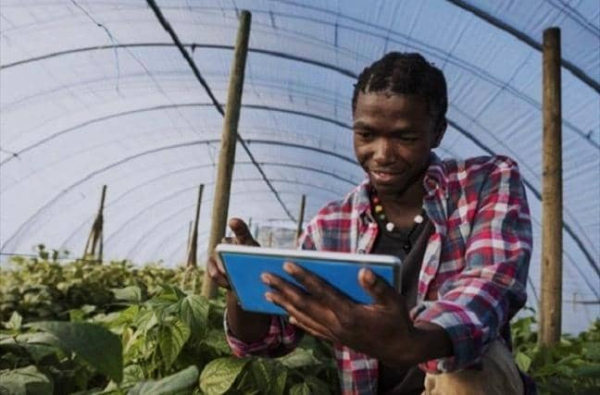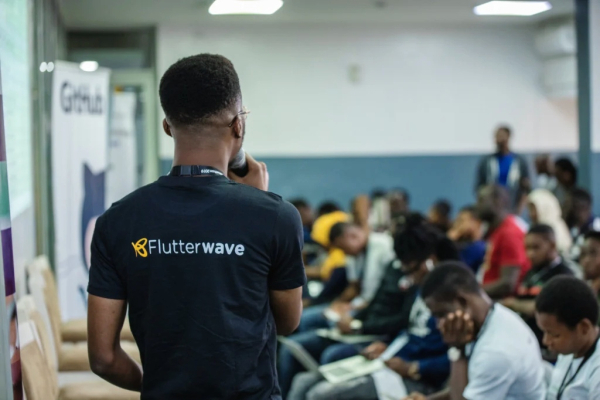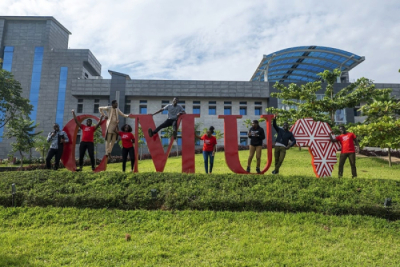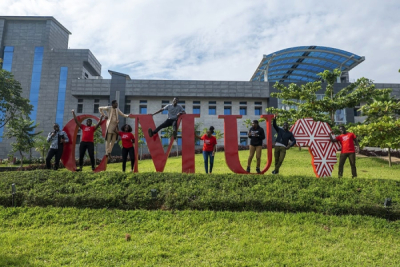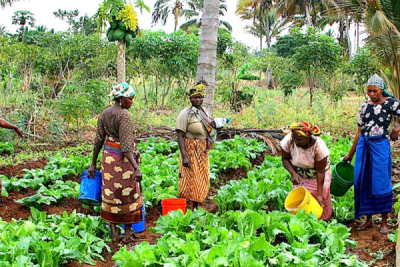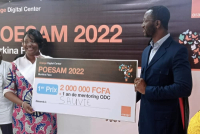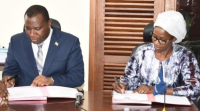
Tech (802)
One year after the first edition of the YouthADAPT Challenge, which rewarded twenty African start-ups, the two partners are again calling on young people to submit innovative solutions and business ideas that can help adapt and build resilience to climate change.
The Global Centre for Adaptation in partnership with the African Development Bank (AfDB) launched, on Wednesday 15 September, the second edition of the Youth Adaptation Solutions Challenge (YouthADAPT Challenge) on climate change adaptation.
The call is open, till, October 4, 2022, to young entrepreneurs aged 18 to 35, micro, small and medium enterprises (MSMEs) as well as other youth-led or youth-owned companies in Africa (50% female-led).
To be eligible, start-ups must be based or legally registered in Africa. They must also provide climate adaptation or resilience solutions that address real-life challenges.
The twenty successful business plans will each receive development grants of up to US$100,000. They will also benefit from a 12-month business acceleration program to help them scale up their businesses and create decent jobs. In addition, dedicated support and mentoring for the winning companies will help them develop partnerships, share knowledge, and learn through a network of young entrepreneurs invested in climate change adaptation.
Since the launch of the eNaira on October 25, 2021, Nigeria has been working to stabilize its weakening currency, curb the rising inflation and boost growth after the economic disruption caused by the Covid-19 pandemic.
Nigerian company Flutterwave announced on Wednesday, September 14 that merchants will now be able to accept eNaira payments from their customers on their platform. The new payment option adds to the existing ones, including bank cards and transfers, barter payments, etc.
In its product update published the same day, the company explains that the move aligns with its commitment to providing the “best payment experience for businesses everywhere.”
“The eNaira joins the robust list of payment options available on Flutterwave. Merchants can now enable the eNaira payment option for collection from their customers via API and Checkout,” it wrote.
The latest information from the Nigerian Central Bank (CBN) revealed that about 270,000 eNaira wallets have been opened, of which 252,000 are consumer wallets and 17,000 are merchant wallets. In addition, the volume and value of transactions have reached over NGN200,000 naira (US$467.5) and 4 billion respectively.
To transact in eNaira on Flutterwave, users will now need to either scan QR codes or generate unique tokens using the app.
Through its platform, Flutterwave provides technology, infrastructure, and services to enable global businesses, payment service providers, and pan-African banks to accept and process payments on any channel (Web, Mobile, ATM & POS). The company which currently operates in Africa, Europe, North America, and other emerging markets provides a suite of payment tools that enable over one million businesses to accept payments from their customers worldwide in over 150 currencies, including Naira and now eNaira.
With this move, Flutterwave eases the implementation of Nigeria’s economic strategy to boost the use of its digital currency by attracting even more unbanked users including merchants “after a first phase adoption saw 850,000 downloads by bank customers.”
Samira Njoya
In Africa, with the acceleration of digital transformation, there is currently a shortage of digital skills. The situation is concerning for various governments, which are stepping up efforts to create digital skill pools and reduce unemployment at the same time.
The Smart Africa Digital Academy (SADA) recently launched a national digital academy to promote digital skills in Benin. The founding memorandum of understanding was signed, last Thursday (September 8), by Lacina Koné (photo, right), CEO of Smart Africa, and Aurelie Adam Soule Zoumarou (photo, left), Beninese Minister of Digital Economy.
According to Lacina Koné, “SADA is a direct solution to the digital skill shortage facing Benin, in particular, and Africa as a whole. SADA Benin will support [authorities’] agenda that aims to place digital skills at the core of Africa’s current and future socioeconomic development.”
In the framework of the partnership agreement between Bening and the Smart Africa alliance, forty cybersecurity and artificial intelligence instructors are already being trained. Once their training is completed, those instructors will train and pass on their skills to other instructors to build a pool of qualified instructors. The SADA also plans to offer advanced ICT courses to managers and teachers.
Thanks to the reforms and flagship projects in the Beninese government's strategic plan, the country jumped from the 177th spot in the UN e-Government Development Index in 2016 to the 157th spot in 2020.
The SADA Benin initiative will therefore be a key support to the country’s digital transformation plan, which aims to transform Benin into a digital services hub in West Africa.
For Minister Aurelie Adam Soule Zoumarou, the alliance will "consolidate the efforts already undertaken by the Republic of Benin in the framework of its national development program and provide new cooperation opportunities.”
SADA Benin is the fourth national academy launched by Smart Africa since January 2022. The first three were in Congo, Rwanda, and Ghana. The alliance plans to launch similar academies in Burkina Faso, Côte d'Ivoire, Tunisia, Kenya, the Democratic Republic of Congo, Djibouti, and Sierra Leone in the coming months.
Since it began operations in August 2020, focusing on the Capacity Building for Decision Makers (CBDM) module, SADA has trained approximately 3,000 decision and policymakers across 26 countries on topics related to digital transformation and hot emerging technologies. Its goal is to train more than 22,000 people in partner countries, by 2023.
Samira Njoya
In Africa, economically disadvantaged populations’ poor access to technological skills raises concerns about increasing inequalities in the job market. Actors are inking partnerships to ensure the digital economy benefits everyone.
Carnegie Mellon University Africa (CMU-A), the Mastercard Foundation, and the Rwanda government will train 10,000 African youth from economically disadvantaged communities in digital skills. For that purpose, the three parties signed a US$275.7 million agreement yesterday.
According to an official release, the investment provided by the Mastercard Foundation “includes a $175M endowment to perpetually fund CMU-Africa [...] and $100.7M to establish CMU-Africa’s Center for the Inclusive Digital Transformation of Africa.” The funds will help reach a broad audience as well as specific targets, including young women, youth with disabilities, and forcibly displaced youth. The beneficiaries will receive advanced training in information technology, electrical and computer engineering, and artificial intelligence. Some of the training programs will be delivered online.
According to the World Bank, millions of young Africans will be in the job market by 2030. For Farnam Jahanian, president of Carnegie Mellon University, "it's important to give them access to education in the high-tech fields that are driving the economies of the future.”
Rwandan Minister of Education, Valentine Uwamariya, indicated that the “strategic partnership with Carnegie Mellon University is one of the Government of Rwanda’s key investments to support the development of a critical mass of skills [...] required by the knowledge economy and to help accelerate Rwanda and the region’s socioeconomic transformation.”
The agreement between Carnegie Mellon University Africa and the Mastercard Foundation builds on a previous partnership between the two parties, as well as a successful 10-year collaboration between the Rwandan government and the academic institution.
Samira Njoya
In the last few years, blockchain has become one of the important technologies used in the development of a wide range of IT solutions. In recent months, several games and service platforms using cryptocurrency and NFT technologies have made the news.
Nigerian blockchain gaming platform blockchain Metaverse Magna (MVM) announced, Monday (September 5), that it had secured US$3.2 million during a seed token sale round. Thanks to the funds raised, it plans to build Africa’s largest gaming decentralized autonomous organization (DAO) and offer gamers access to world-class opportunities.
According to Yele Bademosi, CEO of Netscoin (which developed MVM), “Africa has the highest youth population globally, but over 60% of the continent’s youth are unemployed […] Gaming presents a unique opportunity to help young Africans earn and lift themselves and their families out of poverty.”
Therefore, “MVM’s seed sale token ensures opportunities for millions of gamers in these emerging markets,” he added.
In its 2021 cloud gaming report, Newzoo indicates that in Sub-Saharan Africa, the gaming population rose from 77 million in 2015 to 186 million in 2021. The report also forecasted that the population would grow further in the next three years.
During its market research for MVM, Nestcoin noted the ever-growing number of African gamers and the lack of platforms combining gaming and blockchain. In 2021, it started a gaming guild offering play-to-earn scholarships to over 1,000 gamers to play crypto games like Axie Infinity and Pegaxy.
To date, Nestcoin claims more than 100,000 members across its products and community. It plans to build a social gaming app that would reduce unemployment in Africa and create opportunities for the continent's 186 million-plus gamers. "[...]In a decade, I would love for us to have the kind of impact that Tencent has had on the gaming industry in Asia. If we can do up to 2% of that, it will be incredible," said Yele Bademosi.
Samira Njoya
In Nigeria, women comprise more than half of the rural labor force. This exposes them to rural-urban income disparities. To help them cope in case of increased rural poverty, programs are underway to empower them and make them able to capitalize on the digital economy.
Nigeria and the UN Women will launch a digital farming platform for women in the coming months. The plan was disclosed by the Nigerian Minister of Women Affairs Pauline Tallen, during the visit of Beatrice Eyong, UN Women’s representative to Nigeria, last Wednesday.
According to Minister Pauline Tallen, similar projects focused on empowering women should receive more funds because “once a woman is empowered, the home and lifestyle of her family will change and the nation will be healthier and better-off.”
“If the government could focus more on empowering women, it will not only change the lives of women alone but jump-start the economy,” she indicated.
The announced platform will provide users an overview of a business lifecycle, the tips, and tools needed to avoid distress selling, sell products at higher prices and reduce post-harvest losses.
According to Beatrice Eyong, the platform will also help improve rural communities’ economic and financial abilities, “introduce them to the digital economy, and prepare them for climate change.” She added that countries like Mali, and Senegal have already embraced similar platforms, benefiting women and even men.
The platform is part of the World Bank-supported program Nigeria for Women Project (NFWP), which aims to improve women’s livelihoods. The 5-year program plans to build the capacity of 324,000 women, facilitating their access to livelihood opportunities. According to the World Bank, in Nigeria, the significant rural-urban income disparity affects women, particularly the 54 million (out of a total of 80.2 million women) women who live and work in rural areas and provide 60-79% of the rural labor force. A significant increase in rural poverty translates into an increase in female poverty. Hence the need to build women’s capacities.
Samira Njoya
Since its arrival in the South African market nine years ago, Uber has gradually expanded its services on the continent covering eight other countries. In the coming years, it plans to add more to its continental markets.
US ride-hailing company Uber announced, Tuesday, September 6, its launch in eight African cities with new products and features. According to the company's statement, the cities are located in Nigeria, South Africa, Ghana, Kenya and Ivory Coast, where it already operates.
“As we prepare to celebrate our 10th anniversary next year, we’re excited to move into more cities so people can go wherever they want and get whatever they want. Our commitment to raising the bar on safety remains unwavering, and we continue to work hard to grow the more than 3 million earning opportunities we’ve created so far,” said Kagiso Khaole, general manager of Uber Sub-Saharan Africa.
The company's expansion into new markets comes with the introduction of new services such as UberX Share, Uber ChapChap Share, UberXL, UberXL Reserve and Uber Van Reserve. The new services offer riders the opportunity to save up to 30 percent off the normal ride price. Some services such as UberXL Reserve and Uber Van Reserve will allow riders to book their group trips 30 days in advance.
Since its arrival in Africa in August 2013, Uber has been steadily rolling out new features to attract customers. Three new safety features will be announced in the coming months, including audio recording (in South Africa), we learn. The audio recording feature will allow users and drivers to record and share audio during the ride to serve as evidence in case of safety incidents.
Uber's presence in these eight new cities - namely Owerri and Akure in Nigeria; Eldoret, Kisumu, Nakuru, and Naivasha in Kenya; and Tamale and Sunyani in Ghana - will create new economic opportunities in Africa.
In an article published on May 26, 2022, by South African Daily Maverick, Mpho Sebelebele, Uber's communications manager for South Africa, indicated that the ride-sharing company has created more than six million economic opportunities in over 50 sub-Sarahan African cities since 2013.
Samira Njoya
The digital and mobile ecosystems are important tools that can help Africa achieve sustainable development goals. Indeed, apart from the jobs they can create, they can also improve education, health, and governance. That is why, in recent years, numerous projects are implemented to capitalize on the opportunities offered by those ecosystems.
The GSM Association (GSMA) and German Cooperation Agency (GIZ) recently issued a call for applications for the Platforms for Tomorrow acceleration program under the Mobile Innovation Hub jointly implemented in Tunisia since 2020.
The aim of the acceleration program is to support innovators that develop platforms to act as a bridge between supply and demand while facilitating social, economic, and human development. Applications are open till September 25, 2022.
The main targets of the 6-month acceleration program (October 2022- March 2023) are applicants whose solutions have active users, early sales, or already launched products. The solutions must also have strong social and economic impacts.
The program is also interested in solution developers with a potentially scalable product or service that has a significant total addressable market. It also targets innovators willing to improve the quality, performance, and well-being of their employees by offering dedicated training and solutions that have “potential for synergy with Mobile Network Operators (telecoms).”
Muriel Edjo
Orange issued calls for applications for the national phase of its social venture prize in Burkina Faso, on March 28, 2022. It received over 500 applications but only ten were selected to present their projects to the jury.
Last Friday, September 2, Burkinabe startup AINO Digital SAS’ digital identity project Sauvie won the first prize in the national phase of the Orange Social Venture Prize (POESAM) in Ouagadougou. The startup, founded by Scarlett Zongo (photo, left), thus won a check of XOF2 million. The second (Diabète contrôle) and third (Alliance Pharma) winners went home with respective checks of XOF1.5 million and XOF1 million.
The digital identity project, which won the first prize, is a bracelet with an ornament that is embedded with a QR Code. The QR code contains the wearer’s health information and emergency contacts. It, therefore, gives all the information needed to receive first aid when the need arises.
“We started working on the project in 2018 and finally launched it in February 2022. Since its launch, we have received important support from the national fire agency and the Ministries of Defence and Territorial Administration. We were able to work with those institutions to fine-tune Sauvie so that it can be able to address the issues faced by our societies,” indicated Scarlett Zongo.
Orange launched its POESAM awards, twelve years ago, to support startups that offer useful solutions to the population. This year, Burkina Faso has organized its fifth national phase, receiving more than 500 applications. During the national phase, a women entrepreneurs prize was also awarded. It was received by the founder of Women Health, who won a check of XOF1.5 million and one year of mentoring at the Orange Digital Center.
Let's note that the three winners of the national POESAM edition will take part in the international phase against the winners of sixteen other countries.
Adoni Conrad Quenum
Information and communications technologies have become vital tools in every sector nowadays. From democratized internet to digitized networks, they all have their importance and are strong allies in the transformation of economies. Burundi wants to capitalize on those technologies to efficiently implement its 2018-2027 national development plan.
Burundi will soon kick off the digitization of its public services. For that purpose, last Thursday, August 29, it signed a US$50 million financing agreement with the World Bank. The agreement was signed by the Minister of Finance, Domitien Ndihokubwayo (photo, left), and the World Bank's Resident Representative in Burundi, Hawa Cissé Wagué (photo, right).
According to Minister Domitien Ndihokubwayo, the agreement is an opportunity for the government to raise additional resources to dedicate to its e-government ambitions, allowing the achievement of planned development projects.
This funding will allow the country to install high-speed Internet connections, digitize its education sector, provide an internet connection to rural populations and improve public services. It will also enable the government to provide basic computer training to women and the less privileged.
According to the World Bank, Burundi has an excellent national ICT development policy but the institutions tasked with the implementation of that policy lack the capacity to do so. To date, only a few of the set targets have been achieved. The 5-year program funded by the World Bank financing aims to address the situation. The first project the government wants to implement for that purpose is the elaboration of a legal personal data protection framework.
According to the World Bank representative in Burundi, this project will support the government in the implementation of its digital vision defined in the 2018-2027 National Development Plan, which aims to transform Burundi’s economy.
Samira Njoya
More...
Digital transformation is accelerating in Africa, forcing public administrations and private companies to adapt. However, there is a shortage of local skilled experts to support that transformation. Hence an urgent need to train a qualified workforce.
From September 1 to 30, 2022, applications are open for Power Learn Project’s one million software developers program in South Africa.
According to Mumbi Ndung'u, Power Learn Project’s chief growth and operations officer, through its “one million software developers” program, Power Learn Project’s goal is “to drive transformative change for the youth of Africa through technology skilling.”
“The program will offer online junior software development training [... as well as soft skills component in employability, entrepreneurship, and their mental well-being [...]to enable the learners to not only acquire entry-level smart technology jobs but to also be wholesome members of the community,” he added.
At the end of the 4-month learning program, participants will receive certificates proving they have completed the courses. This is the second cohort of the “one million software developers for Africa”. The first cohort was launched in Kenya, in June 2022. In the coming months, more cohorts will be launched in Zambia, Nigeria, Ghana, Rwanda, and Uganda.
In its "Africa Developer Ecosystem Report 2021" published on February 21, Google reveals that the demand for developers is growing worldwide, especially in Africa. Indeed, the ongoing digital transformation has boosted the need for developers and the continent may experience a shortage of professional developers if it fails to take adequate measures. That is why Power Learn Project wants to help train the next generation of developers who will support Africa in its digital transformation efforts.
Muriel Edjo
In 2016, Senegal launched DS2025, its strategy to develop its digital economy by 2025. The strategy is focused on several sectors to allow the modernization of the economy and improve competitiveness.
In Senegal, 105,000 jobs will be created in the digital sector by 2025. The figure was disclosed by Minister of Digital Economy Yankhoba Diattara, Tuesday, August 30, while opening the third edition of the National Digital Forum and the second edition of the Head of State’s Grand Prize for Digital Innovation.
According to the official, it will be the result of key reforms of the “Digital Senegal 2025” strategy, which will “undoubtedly allow the structural transformation” of the country’s economy, “position it as a digital hub in West Africa, and boost the digital sector’s contribution to GDP by 10% by 2025.”
Indeed, to successfully implement the strategy, the government will undertake a certain number of actions, which will create those jobs. For instance, the country intends to increase internet access for an expanded digital economy. Its plan in that regard is to increase 4G coverage to 90% and halve fixed and mobile internet costs.
Also, to facilitate digital adoption, the government recently adopted a startup law that will ease the development of innovative companies. It also plans to provide financial and technical support to guarantee the seamless development of innovative industries.
During his August 30 address, Yankhoba Diattara acknowledged that much remains to be done to reach the 2025 goal. However, he also expressed confidence in the country reaching those goals by the set deadline because the government is much committed to developing the “digital economy by injecting significant resources to strengthen the ecosystem.”
Samira Njoya
Fifty African startups have benefited from the program’s technical and financial support over the past five years. Its beneficiaries have already raised more than US$150 million in funding.
Incubator Startupbootcamp AfriTech issued, Monday (August 29) calls for applications for the third cohort of its ASIP Accelerator Program. Applications are open till November 11 for the program, which will run from February 20 to May 25, 2023.
To be considered, start-ups must be formally established and have at least two people working on the project and devoting at least 50 percent of their time to it. They must also generate revenues from the product and services they offer.
For this new edition of ASIP Accelerator Program, the targeted sectors are AgriTech and Supply Chain, FinTech, IoT and Connectivity; Machine Learning (Data Analytics), Cybersecurity, CleanTech and RegTech.
The ten early-stage startups selected at the end of the selection process will benefit from intensive coaching, pilot, and proof-of-concept opportunities that will open doors to longer-term business deals.
Each of them will receive €15,000 in cash as well as over €500,000 in credits and will benefit from exclusive partnership agreements with leading technology providers such as AWS, Google, Miro, Hubspot, and many others.
Five of them will be fully funded and supported by the EiA project and receive more support including access to the Euroquity community, networking events, monitoring, etc.
For this new edition, the incubator has the Netherlands Development Finance Company (FMO), the Senegalese General Delegation for Rapid Entrepreneurship of Women and Youth (DER/FJ), telecom operator Telecel Group, and Enrich in Africa (EiA) -funded by the European Commission's Horizon 2020 program- as its partners.
Muriel Edjo
In Africa, access to affordable loans is mainly the daily challenge faced by small businesses. In recent years, fundraising has emerged as one of the main sources for them to access the required capital and expand their businesses.
Scalable digital lending platform Pezesha announced on Tuesday, August 30, that it has secured US$11 million in pre-series A investment.
“We are excited about attracting institutional investors led by the Women’s World Banking Capital Partners II to harness our growth plans and push our mission to the next level. We are equally excited that WWBCP II intentionally invests in women, which allows us to cement inclusivity in our growth plans as a sustainable path towards our vision of building Africa’s MSME lending infrastructure,” said Pezesha founder, Hilda Moraa.
Pezesha was founded in 2017, in Kenya. It connects SMEs and financial institutions, helping the former raise working capital. Doing so “encourages meaningful financial inclusion and reduces inequality in access to formal financial services.” Pezesha also provides financial education and debt counseling to MSMEs to help them improve their credit score and have responsible borrowing habits as they move up the Pezesha financial ladder.
The additional capital, consisting of $6 million in equity and $5 million in loans, will enable it to expand its operations in its core East African markets and explore opportunities in new Sub-Saharan African markets.
The fintech claims to have more than 200,000 partners to date and over 100,000 loans made to MSMEs in Kenya, Uganda, and Ghana.
Samira Njoya


